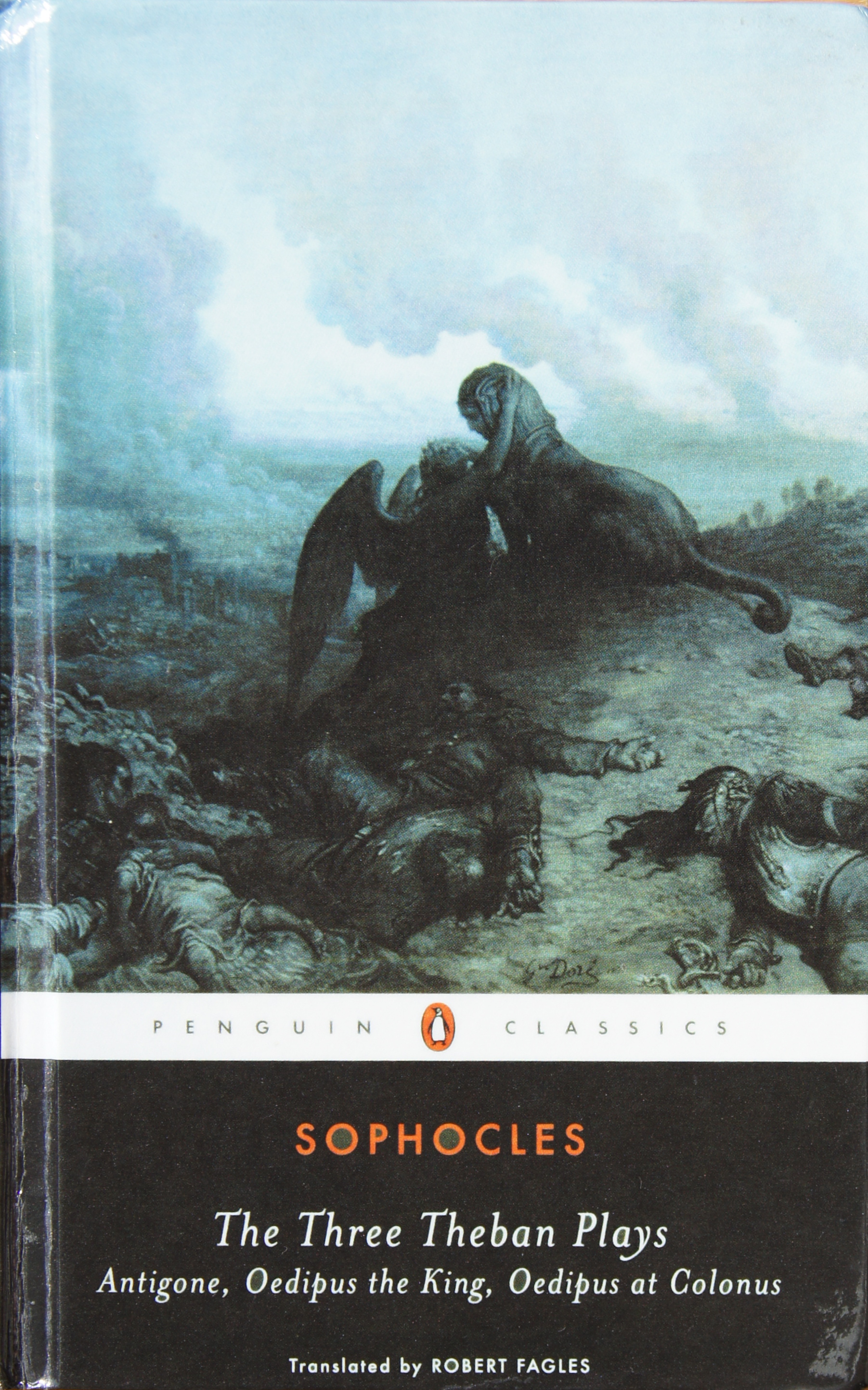We have an interlude now in the midst of these long books with a couple of foundational, all-time standard plays. Antigone, especially, is so short (or, if you prefer, concise) that even going over it at the most leisurely pace possible while still getting any productive reading done, a couple of days is about the maximum required to complete a reading in English. I don't remember how many times I have had to read this, for school, or one list or another. Three? Four? This time felt to me like the most successful effort, that I had the best frame of mind, concentration, the best overall grasp of the literary and mythical world in which the play took place. Of course one can only get so far reading it in English. It is pretty much certain at this point that I will ever become proficient enough in Greek to be able to really read the literature, beyond making painstakingly slow translations, which I can do to some extent now, though my vocabulary remains weak. So I am not going to kill you with a lot of literary analysis, which you will either already know or can get elsewhere. I read the old Elizabeth Wyckoff University of Chicago translation, which is the good old mid-century scholarship I am most comfortable with and have the most trust in with regard to emotional tone and things like that. This (the tone) seems to me at least, based on my biases and school experiences, what Greek literature conveyed into English should be like, especially for middling intellects.
The concern with order and duty and the conflict between the competing ideas of what constitutes these that form the subject of the play made a stronger impression on me on this occasion than they had formerly, perhaps since in our own time these ideas as they apply to governing bodies and societal harmony, and oddly to me, perhaps even the cosmos itself, are weakening and being relentlessly questioned. They are not associated with promoting a greater, or common good, at least the ideas of duty and order that are invoked. Such ideas were strong however among ancient writers and in the systems that they devised or made records of. Creon comes across negatively in the play because he wishes to suppress an action rooted deep in custom and long practice for the sake of order. The implication is that he is attempting to impede the carrying out of necessary activity, of necessary duty, which is the true source of order. The importance of Antigone's being a woman is not of paramount significance to me, other than that I think it heightens the drama of the act of defiance, and suggests an awareness and interest in the feminine will and capacity for opposition that is not always evident in classical authors....
I had inserted a heading here to be filled out later called Notes on my feelings. That would be feelings evoked by this reading. Naturally any Greek reading evokes memories, usually fond enough ones, of my school days, and will always continue to inform my encounters with these kinds of books, because I can associate them with the people, and social activities of that time, which in many instances involved real experiences and relationships rather than the more imaginary ones with which I associate other kinds of books. The story I accept as a kind of fact in itself, possessed of a being that is greater and more essential to the aspects of human existence that are of interest to me. And all of that.
The Challenge
The magic words for Antigone are frequently ones that are very particular to itself. This has the effect, as with other classical stories, of leaving a very small field for the tournament.
1. Virginia Woolf--Night and Day..............................................................301
2. Charles Boyce--Shakespeare A to Z..........................................................31
3. Antigone (film--Greece 1961)...................................................................25
4. Harold Bloom--Bloom's Critical Interpretations: Oedipus Rex................23
5. John Gardner/John Meier--Gilgamesh......................................................22
6. Seamus Heaney--The Burial at Thebes.....................................................21
7. Eleanor Fuchs--The Death of Character: Perspectives on Theater, etc.....0
8. Dina Gujesnova--European Elites and Ideas on Empire 1917-1957..........0
9. Patricia Clark--Wreath For the Red Admiral...............................................0
Play-in Round
#8 Gujesnova over #9 Clark
I can't tell what kind of book the Clark is, but libraries don't have it anyway.
Round of 8
#1 Woolf over #8 Gujesnova
#7 Fuchs over #2 Boyce
#6 Heaney over #3 Antigone
#4 Bloom over #5 Gardner/Meier
I don't particularly like Harold Bloom, but his book here is shorter than Gilgamesh, and I don't think I am really up for that epic at this time anyway.
Final Four
#7 Fuchs over #1 Woolf
The Fuchs book is fairly obscure, but there are places that have it, and it is only 224 pages. Woolf is intriguing here, since I have never heard of this particular novel. However it runs around 450-500 pages, and especially with the insertion of the Knausgaard book into the slot where the challenge books go, I am going to need some shorter winners.
#6 Heaney over #4 Bloom
Championship
#6 Heaney over # 7 Fuchs
The Heaney book is actually just his version of the Antigone, which would be technically illegal. However, being a Nobel Prize winner and one of the handful of most celebrated poets in English of the last fifty years, his version probably can be counted as a work of literature in itself rather than a straight translation. And at 79 pages, it is practically a no-brainer here.



No comments:
Post a Comment